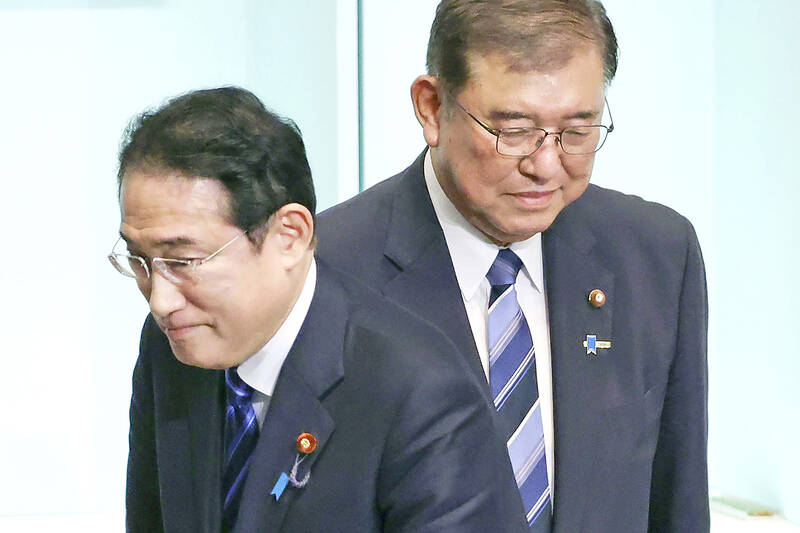New Liberal Democratic Party (LDP) leader Shigeru Ishiba said he would call a national election on Oct. 27, assuming he is confirmed as Japan’s new prime minister today, taking advantage of a positive public reaction to his victory in Friday’s LDP leadership election.
“It is important that the new government be judged by the people as soon as possible,” Ishiba said in brief remarks to the press yesterday.
Ishiba is set to name party veterans to senior posts in his Cabinet as he broadly pursues continuity in economic, monetary and foreign policy. The new administration is officially launch after today’s vote in the LDP-dominated parliament.

Photo: AP / Kyodo News
The role of finance minister is set to go to Katsunobu Kato, a former top government spokesman, while Ishiba is to name Takeshi Iwaya, a former defense minister, as his foreign minister, public broadcaster NHK and other Japanese media reported.
Ishiba’s decision to call a quick election is a move to win a mandate for his administration while there is an uptick in voter support. A survey by the Mainichi Shimbun found that 52 percent of the public were optimistic about the new government.
The surprise victory by Ishiba in the LDP leadership battle reflects a bid by the party to win back public trust after a fund-raising scandal and inflation woes sent the approval ratings of outgoing Japanese Prime Minister Fumio Kishida plummeting.
Ishiba has consistently been one of the most popular leadership candidates among the public. His distance from previous administrations gives him a cleaner image to project in an election.
The ruling LDP is unlikely to be ousted in any near-term national vote, given the relatively low support ratings of other parties. The main opposition party has just replaced its leader to try and revive its flagging support levels.
Tokyo stocks yesterday closed down more than 3 percent as investors factored in the sharp rebound in the yen that followed Ishiba’s surprise win over Bank of Japan (BOJ) easing advocate Sanae Takaichi.
A Takaichi victory was seen as likely to slow down or put the brakes on interest rate hikes by the central bank, putting pressure on the currency to weaken.
During his leadership campaign, the 67-year-old Ishiba expressed support for the BOJ’s policy normalization.
In a television interview on Sunday he said it was important to keep monetary conditions accommodative, suggesting there was no rush to raise borrowing costs.
“I don’t think we should be talking about interest rates in a situation where we still can’t say for sure that deflation has been defeated,” Ishiba said during an interview with Fuji TV.
Ishiba has said his economic priorities are to defeat deflation and raise wages, while encouraging revitalization of Japan’s rural regions.

THE TRAGEDY OF PUNCH: Footage of the seven-month-old Japanese macaque has gone viral online after he was rejected by his mother and formed a bond with a soft toy A baby monkey in Japan has captured hearts around the world after videos of him being bullied by other monkeys and rejected by his mother went viral last week. Punch, a Japanese macaque, was born in July last year at Ichikawa City Zoo. He has drawn international attention after zookeepers gave him a stuffed orangutan toy after he was abandoned by his mother. Without maternal guidance to help him integrate, Punch has turned to the toy for comfort. He has been filmed multiple times being dragged and chased by older Japanese macaques inside the enclosure. Early clips showed him wandering alone with

South Korea would soon no longer be one of the few countries where Google Maps does not work properly, after its security-conscious government reversed a two-decade stance to approve the export of high-precision map data to overseas servers. The approval was made “on the condition that strict security requirements are met,” the South Korean Ministry of Land, Infrastructure and Transport said. Those conditions include blurring military and other sensitive security-related facilities, as well as restricting longitude and latitude coordinates for South Korean territory on products such as Google Maps and Google Earth, it said. The decision is expected to hurt Naver and Kakao

MONEY GRAB: People were rushing to collect bills scattered on the ground after the plane transporting money crashed, which an official said hindered rescue efforts A cargo plane carrying money on Friday crashed near Bolivia’s capital, damaging about a dozen vehicles on highway, scattering bills on the ground and leaving at least 15 people dead and others injured, an official said. Bolivian Minister of Defense Marcelo Salinas said the Hercules C-130 plane was transporting newly printed Bolivian currency when it “landed and veered off the runway” at an airport in El Alto, a city adjacent to La Paz, before ending up in a nearby field. Firefighters managed to put out the flames that engulfed the aircraft. Fire chief Pavel Tovar said at least 15 people died, but

Australian Prime Minister Anthony Albanese yesterday said he did not take his security for granted, after he was evacuated from his residence for several hours following a bomb threat sent to a Chinese dance group. Albanese was evacuated from his Canberra residence late on Tuesday following the threat, and returned a few hours later after nothing suspicious was found. The bomb scare was among several e-mails threatening Albanese sent to a representative of Shen Yun, a classical Chinese dance troupe banned in China that is due to perform in Australia this month, a spokesperson for the group said in a statement. The e-mail